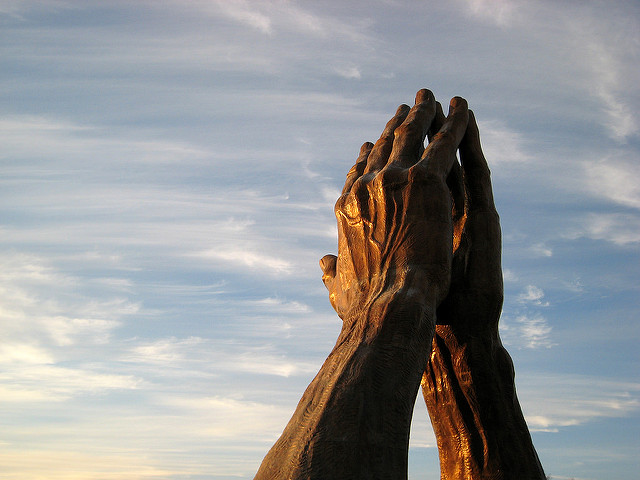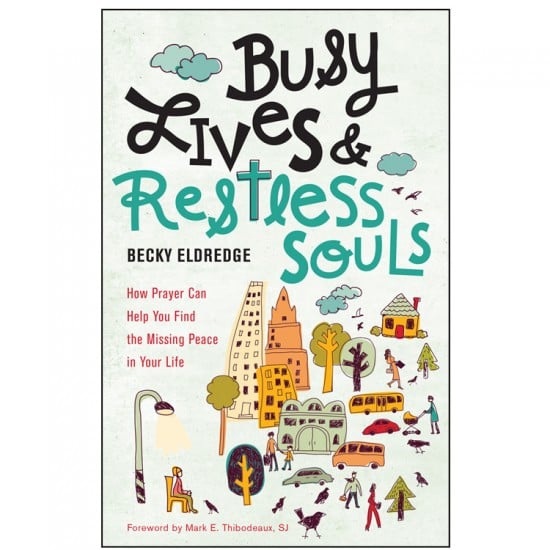
What is prayer?
In Everything Belongs, Richard Rohr says, “Prayer is being loved at a deep, sweet level.”
And it seemed just that simple when I was a child. It was those magic words you said before you ate and before you got into bed at night. I pictured some sort of Godman in the sky, looking down, nodding appreciatively whenever I remembered to say them. The way my mother did.
Over the years, prayer, for me, became far more complex. While trying on various disciplines from Buddhism to Baha’i, I discovered that prayer was “used” in myriad ways. To center, to calm, to contemplate, to commune. Or as a cry for help, a cry of gratitude and praise.
The most moving recent example of both the latter I’ve heard was the final prayer uttered by a group of 21 Coptic Christian martyrs, as they were being beheaded one by one, by Isis assassins on a beach in Libya. The Christian Post reported that:
“In the moment of their barbaric execution, some of the Christians were mouthing the words ‘Lord, Jesus Christ.'”
As a convert to Catholicism, I have reveled in the joy of reciting and receiving prayer communally during Mass, realizing that all my brothers and sisters all over the world are saying the same words and hearing the same readings that I have.
Likewise, I’ve begun to learn the Rosary, and the many novenas and chaplets and more well-known prayers and to choose, for daily prayers, the ones that resonate most. The first day prayer from the Padre Pio Novena is my “go to.” Especially as recited via the Web site Discerning Hearts.
I am always deeply moved by the tearful “catch” in the reader’s voice as he recites the final verses:
Stay with me, Lord, for it is You alone I look for,
Your love, Your grace, Your will, Your heart, Your spirit,
Because I love You
And ask no other reward but to love You more and more.
With a firm love, I will love You with all my heart while on earth and continue to love You perfectly during all eternity.
But recently, I’ve been struggling with a question many newbies probably come to sooner or later.
I have always prayed in some form or another, for all the reasons mentioned. But I’ve found it difficult to stay focused as I recited the longer and more repetitive prayers I was learning. They were not my words. And in some cases, they were archaic words that did not resonate with or speak to the feelings in my heart.
And while the repetition and rhythm sometimes calmed me, and I was always glad I’d fought my way through for love, I had begun to feel that they almost distanced me from the One I wanted so desperately to reach. As if He could not get a word in edgewise, through the torrent of words.
I decided to investigate “contemplative” prayer at the Benedictine monastery here in Tucson, which reminds me of some of the disciplines I’d studied previously and seems to “open the door” for more fervent and focused prayer after each session of stillness. And our parish just announced the formation of a “Charismatic Prayer Group,” which I will probably investigate as well.
But what does God want, I wondered? Besides the prayer we were taught by His Son?
And as always happens, I began to receive answers to that question, one after the other. One night, choosing a random passage from my audio New American Bible, I heard this:
“In praying, do not babble like the pagans, who think that they will be heard because of their many words.” Matthew 6:7
A day or two later, while reading He And I, the remarkable Gabrielle Bossis journal full of heart lifting messages ostensibly from Jesus to the author, I read:
• “When you say, ‘Sacred heart of Jesus, have mercy on us,’ with love, I grant more grace than for a long, drawn out prayer that you repeat mechanically.”
• “Don’t let praying tire you. Why do you give yourself so much trouble? Let it be simple and heart warming. A family chat.”
• “Don’t aim at saying an exact number of wordy prayers. Just love Me simply.”
He also teaches her, throughout, a number of tiny prayers which He asks her to repeat often, out of true love, instead of the obligatory ones she recites in church.
“…say, ‘My Jesus, I love You,’” He suggests. “And put your heart into it.”
The Bible, too, in 1 Thessalonians 5:16-18, (NAB) commands that we:
“Rejoice always; pray without ceasing. In all circumstances give thanks, for this is the will of God for you in Christ Jesus.”
And of course, the easiest way to do this is, as the the Bossis messages suggest, in short, fervent phrases spoken when the soul moves.
I have, thus far, decided not to choose only one mode of prayer. Each has its own merits, and I seem to know what’s needed, instinctively.
Sometimes it’s the little kiss and caress I plant on one of the statues in the house. Sometimes it’s a full on novena, litany, chaplet or Rosary–I tell non-Catholic friends we do the latter to ask Mary to “holla at Your Boy for me” from time to time.
They have so much trouble with Mary, my Protestant friends. One even said the repetition of the “Hail Mary” by a group on nuns on TV sounded “satanic.” Wow.
In the end, as I continue this journey, I am sure I will make my peace with prayer. An apt turn of phrase, since that is what prayer does for me, even now, when I focus and really feel it. It makes peace. It sends and surrounds me with love.
And so I leave you with the little one I say most often, which is also the one that gets those Divine messages flowing when I need them most:
“Thy Will, be done, Lord. Thy will be done.”
Photo credit: By C Jill Reed, Attribution-ShareAlike 2.0 Generic (CC BY-SA 2.0)












